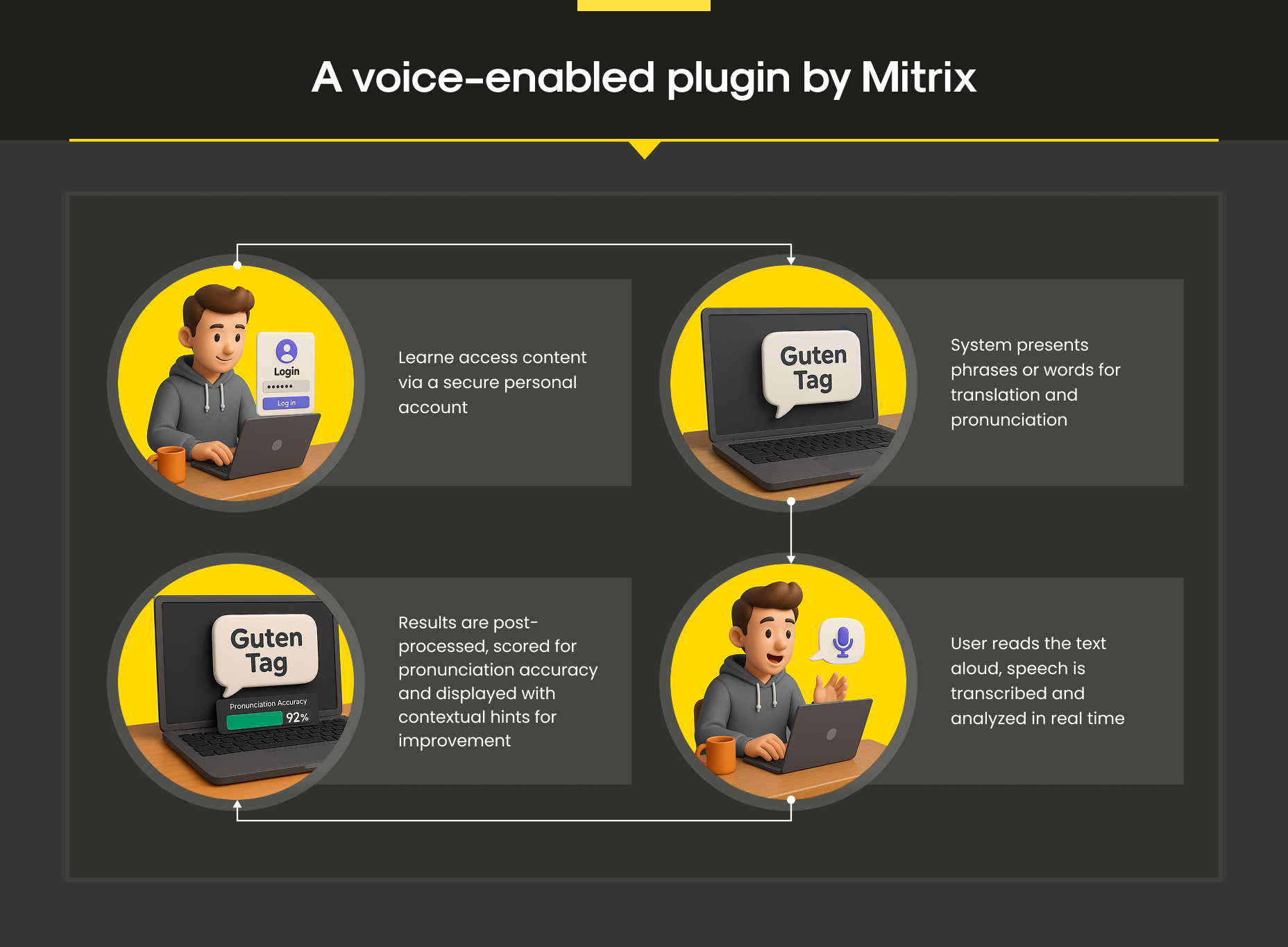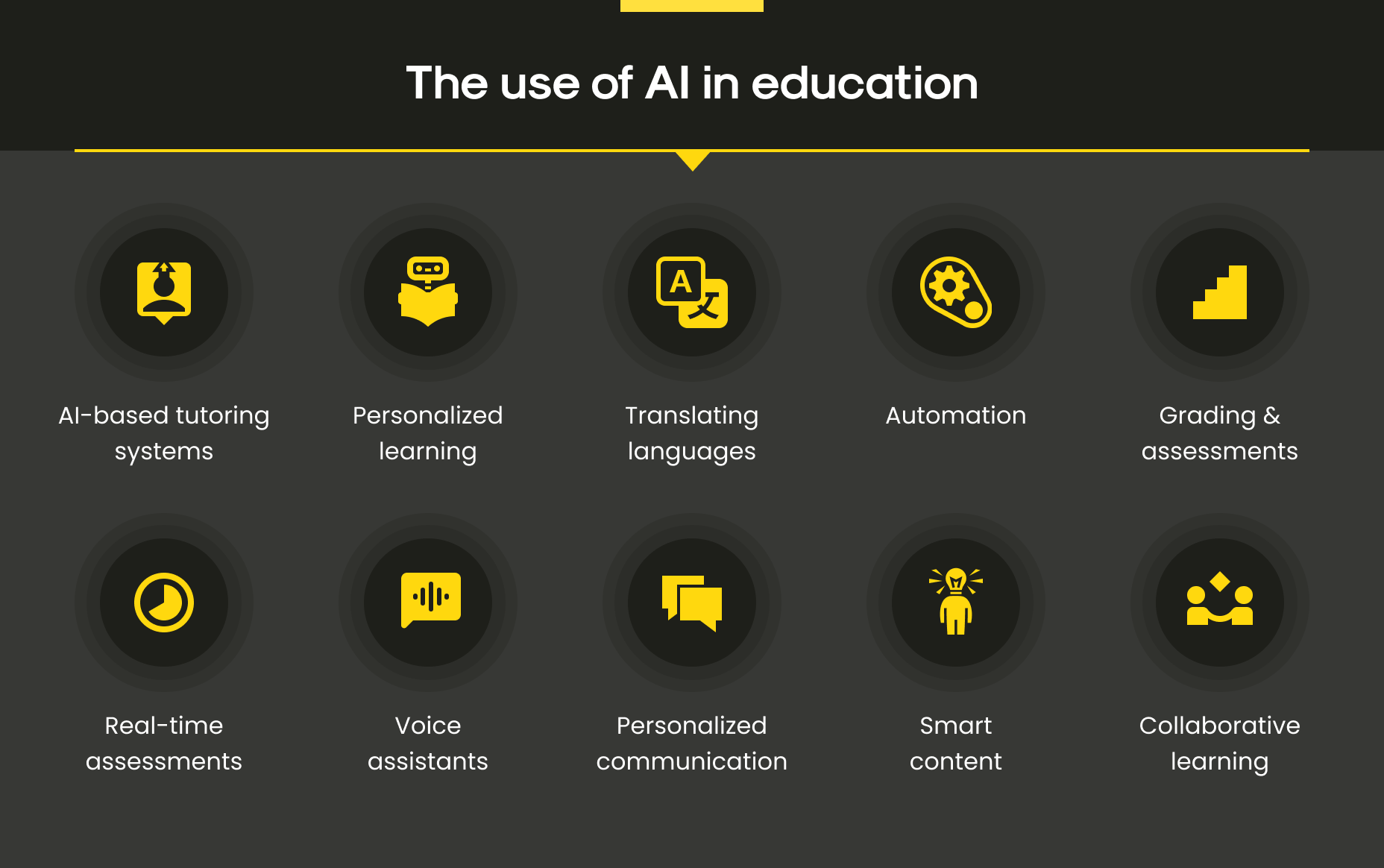Traditional one-size-fits-all methods are giving way to adaptive, personalized learning experiences via online learning platforms, and that’s where AI really shines. For instance, voice-to-text technology helps learners practice speaking confidently, while AI-driven post-processing ensures feedback is not just immediate, but also meaningful. What’s more, mistakes aren’t just marked – they’re explained, so students progress a lot faster.
This approach aligns perfectly with the future of education: more interactive, more inclusive, and powered by AI to meet learners where they are, in any language. Let’s take a look at how this plays out in practice through one of Mitrix’s recent projects.
The challenge: adding interactivity to accelerate learning
Our client, a forward-thinking provider of immersive language learning experiences, needed a way to supercharge user engagement and streamline their platform’s global scalability. With a strong focus on leveraging modern technology, they turned to Mitrix to enhance their educational app with AI-powered, real-time voice interaction.
To create a more engaging and effective learning experience, the client wanted to implement a voice-enabled plugin. This plugin needed to deliver:
- Real-time speech recognition
- Accurate pronunciation scoring
- Adaptive learning feedback
All of it had to integrate smoothly with their existing infrastructure while remaining scalable for future multilingual expansion. In short, they were looking for a partner with deep technical expertise, crystal-clear communication, and a highly collaborative approach.
Our approach: seamless AI integration
Our team at Mitrix developed a custom JavaScript widget that is embedded directly into the client’s e-learning platform. At the core of this solution are two powerful AI technologies:
- Google’s Voice-to-Text API for real-time speech recognition
- OpenAI’s ChatGPT API for post-processing and result normalization
We designed the plugin to:
- Transcribe learner speech in real time
- Use ChatGPT to clean and format transcriptions, including numeric expressions and edge cases
- Output formatted data for precise scoring and adaptive feedback
The plugin empowers learners to actively practice pronunciation and comprehension through real-time, interactive voice tasks, making learning more engaging and sticky.
The results: better learning, lower costs
The client saw immediate improvements:
- Higher engagement. Interactive, voice-driven learning led to longer session durations and better retention
- Improved outcomes. Adaptive feedback helped learners refine pronunciation and comprehension
- Scalable architecture. Modular integration allowed for easier multilingual support and cut down future development costs
What we delivered
- JavaScript widget integrated into platform UI
- Real-time transcription with Google Voice-to-Text
- ChatGPT-powered post-processing for enhanced scoring accuracy
- Adaptive learning feedback output

A voice-enabled plugin by Mitrix
With a solid foundation in place, the client is now exploring further enhancements, including a full-scale translation management system. The success of this project sparked ongoing collaboration and continuous product evolution.
From refining your concept to delivering a user-centric solution, we’re with you every step of the way. With our expertise, we don’t just build software but align technology with your business goals. Are you ready to bring your idea to life? Contact us today!
Technologies used
- Google Voice-to-Text API
- OpenAI ChatGPT API
- JavaScript
By combining smart design with powerful AI tools, Mitrix helped this e-learning platform take a leap forward in engagement, effectiveness, and global readiness.
The benefits of AI in modern education
Artificial Intelligence is transforming education from static instruction to dynamic, personalized learning. By analyzing learner behavior in real time, AI tailors content, pace, and feedback to individual needs and turns a classroom of many into a journey built for one. Beyond personalization, AI enables scalable multilingual support, real-time analytics, and adaptive testing – all of which reduce manual workload for educators and boost learning outcomes for students. It’s not just about teaching smarter, it’s about helping students learn faster, deeper, and with more confidence. From tailoring lessons to simplifying admin work, AI is stepping in where traditional systems fall short.

The use of AI in education
Personalized learning at scale
No two students learn the same way, and AI finally gives educators a way to act on that. By analyzing how learners interact with content, AI can detect patterns, highlight strengths, and identify gaps. For instance, a student struggling with reading comprehension could automatically receive targeted exercises to strengthen that skill. Programs like Louisiana’s statewide rollout of an AI reading assistant show that it’s happening.
Smarter and more dynamic assessments
Standardized tests often paint an incomplete picture. AI changes the game with adaptive assessments that evolve in real time. These tools adjust difficulty based on performance, creating a more accurate, responsive measure of what students know.
AI-powered tutoring
Imagine a student in a rural area with no access to after-school help. Intelligent tutoring systems powered by AI provide round-the-clock guidance, breaking down complex concepts and offering real-time feedback. These digital tutors are bridging gaps, making one-on-one support accessible regardless of geography.
Lifting the load for teachers
AI doesn’t just help learners: it helps educators do what they do best as well. By automating repetitive tasks like grading, attendance, and basic feedback, AI gives teachers more time for personal interaction and instruction. It also flags students who may be falling behind, giving teachers a chance to intervene early and effectively.
Closing the equity gap
In underserved schools, AI can be a game-changer. By delivering personalized content and learning pathways, it brings high-quality education to students who might otherwise go without.
To sum up
As of 2025, AI has proven its value across many industries, and in this project, it played a key role in boosting both engagement and learning outcomes. By integrating speech recognition and natural language processing tools, we created a plugin that responds to learners in real time, adapting to their pronunciation, pace, and comprehension level. This kind of feedback loop is impossible in static learning systems and gives users the feeling that the platform is truly listening and responding to them.
This success highlights how AI can go beyond novelty features and become a core driver of educational progress. As platforms continue to evolve, AI-powered solutions like this will not only personalize learning but also make it more accessible and scalable across languages and regions. So what about the result? A more inclusive, effective, and human-like digital learning experience, and, more importantly, one that grows smarter with every interaction.


